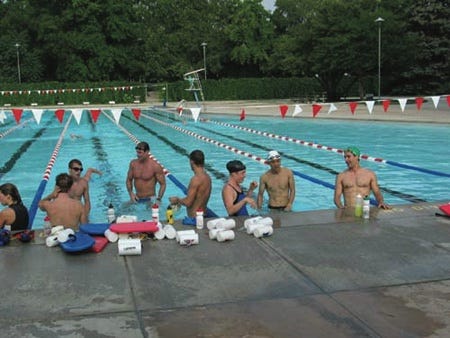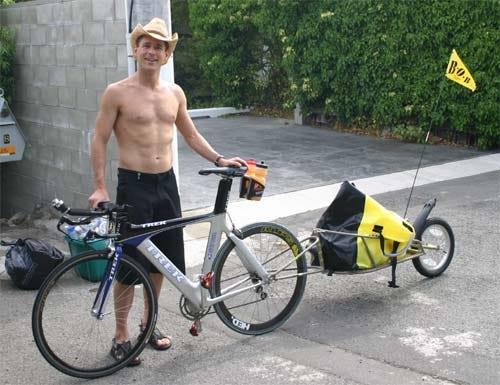I’ve done over 100 training camps.
Across the USA
The Length of New Zealand
Vegas to Boulder
Utah Canyonlands
Routes in the Rockies, Alps, Pyrenees and Dolomites
It’s my favorite way to generate a performance boost…
…and a fun way to see the world.
I think about camp in three phases:
Pre-Camp
During Camp
Post-Camp
I’ve seen, and made, a lot of mistakes. Applying my advice will help you get the most out of your camp experiences.
Before Camp
Three areas of focus before camp:
Gear
Goals
Freshness
Gear: Reduce the chance you’ll have mechanical issues that interfere with training:
Have your bike serviced and ride your bike a couple times after servicing.
Check your cleats & tires for wear. Change if worn and test before arriving at camp.
If you have to fly to your destination then consider renting a bike. If renting then offer to buy new tires for your rental period. Arrive a day early and troubleshoot the bike.
When I fly, I travel with saddle, pedals, saddle bag and pedal-based powermeter. All of this goes in my carry on and I source CO2 cartridges on arrival.
Bring clothing for all conditions. Specifically, if the location is “green” then bring wet weather clothing.
If you will be riding in the mountains then CARRY cold & wet weather clothing, even in summer.
Write down your goals. What are you seeking to achieve at camp? Writing goals will seem like overkill but is essential. Once the camp starts, it’s easy to get carried away with volume & intensity.
Some specific ideas:
Swimming & Cycling are well tolerated. You can safely double your normal load during camp.
Running requires caution. For your first camp (ever, and each season) run easy.
If you are pushing the volume in other sports then it is safest to drop your running to maintenance levels. This means 20-30 minute easy runs at a similar frequency to what you do at home.
Freshness: Treat the camp like an important event. Freshen up and clear the decks with work & family. Tell everyone you love them and will be in touch afterwards.
The Training Camp Effect works best if you unplug from your normal routine.
At Camp
Two Don’ts:
Don’t Go Looking For Work1
Don’t Spend Time Far Above Your Ability
The most common mistake for a Camp Newbie is training with much faster athletes. Avoid this mistake by training at, or under, your ability level. I do best training with groups I can lead.
Let the volume, rather than the intensity, drive your post-camp gains.
Resist the urge to check in with the Real World. Hopefully, you said your good-byes and can keep your downtime chill.
Nutrition: Camp is not the time to lose weight.
Do not weight yourself
Focus on being energy positive
Eat early, and late
Assume you're mildly dehydrated each morning.2
Do Great Training & Finish Strong: Pace your week so your best day is the final one. The humility required will serve you well during camp and on race day.
Let other people make mistakes.
Don’t Go Home Exhausted - stay an extra day, or bring your family to you after the camp.
Hopefully, this camp will be one of many in your life.
After Camp
The camp environment is special. You have completed a lot of training, eaten a ton of food and (hopefully) slept a bunch.
It’s time to let yourself come back down.
Food Taper
Energy Taper
Training Taper
Food Taper: Let yourself eat whatever you want for the first 24 hours post-camp. Then settle back into your normal nutrition.
Energy Taper: Often, you’ll feel like a Superhero in the days, and week, following camp. This is real. It’s also an illusion. Your body has responded to the demands of the camp and is amped up. Be patient and let yourself calm back down. Short, easy, training will help.
Training Taper: Gradually, settle back into your normal training routine. Take one extra recovery day for each day of camp. If you’re unsure then take extra easy days. Better to rest right after camp, than end up with prolonged recovery.
I tell my team:
Everybody can survive one dumb workout.
If you do something silly. It happens. Don’t repeat the error.
While you are absorbing the camp, and avoiding silly mistakes… clear the decks with work & family. You’ve been away for a while. Catch up on work and relationships.
Keep the overall goal in mind…
The goal is to get back to your normal routine, and perform at a higher level once you’ve absorbed the camp (10-14 days).
Target a low-priority race 14 days post-camp. It’s the perfect time to test yourself.
Hopefully, our paths will cross in a future training camp. It’s my favorite environment.
Part Two: How To Structure A Training Camp
Back To Table of Contents
Let duration create the difficulty.
This article on Epic Eating will help if you’re at the extreme limits of volume.









